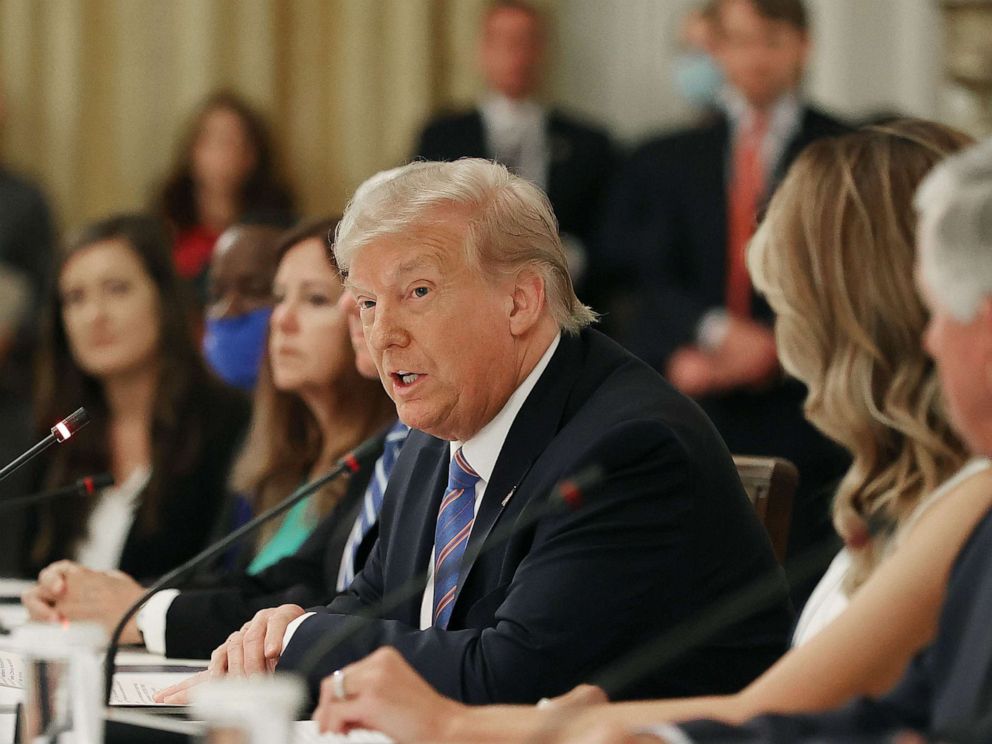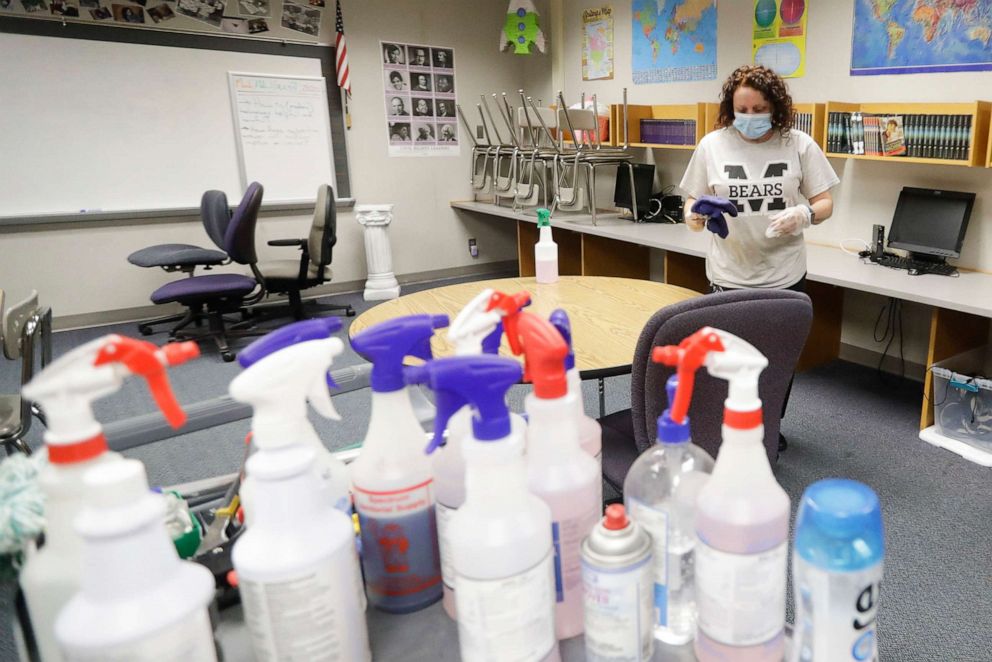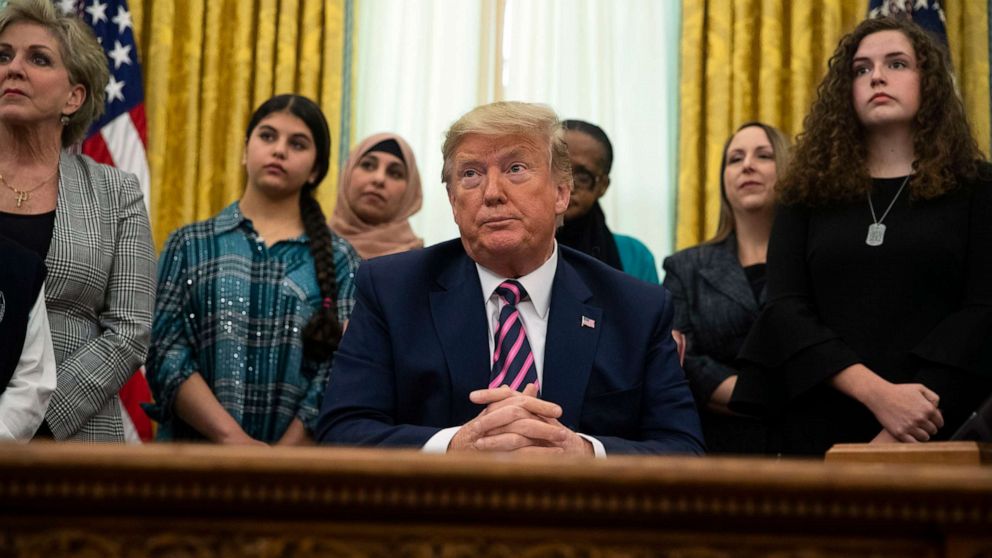Trump insists schools 'must open' in fall, says he'll 'put pressure' on governors to do so
President Donald Trump has been clear about where he stands in the debate over whether schools should resume in-person learning amid the global pandemic, tweeting Monday in all-caps that “SCHOOLS MUST OPEN IN THE FALL!!!”
The president's push to reopen schools in the fall is tied to his broader push for the country to resume normal economic functions as he eyes his own reelection bid in the fall and his promise for a great American comeback despite the ongoing pandemic.
The administration further highlighted the issue on Tuesday, when health and educational leaders, as well as students and parents, converged at the White House for an event with the president, billed as a “National Dialogue on Safely Reopening America’s Schools.”

At the roundtable discussion, he bluntly said he would be “putting a lot of pressure” on governors to open schools, applauding Florida's Republican Gov. Ron DeSantis for saying his state would do so.
“He just announced that the schools will be open in the fall, and we hope that most schools are going to be open,” Trump said of DeSantis.
He then went on to claim that governors who didn't were trying to help themselves politically.
“And we don't want people to make political statements or do it for political reasons. They think it's going to be good for them politically so they keep the schools closed. No way," he continued.
"So, we’re very much going to put pressure on governors and everybody else to open the schools to get them open and it's very important. It's very important for our country. It’s very important for the well-being of the student and parents. So, we’re going to be putting a lot of pressure on opening your schools in the fall,” he said.
Later, Trump sharply criticized Harvard University for announcing plans to only partially reopen in the fall, conducting many classes online, calling that “an easy way out.”
Even as the president has been outspoken about his belief that students should return to the classroom, senior administration officials acknowledged in a call with reporters that local jurisdictions, not the federal government, hold authority over reopening decisions.
“School decisions are local decisions. And so we're going to provide folks with resources both the dollars that we've referenced, but also help identify best practices which the CDC has done, but also other organizations have done as well, to make sure that this can be done safely moving forward,” a senior official said.
The White House focus on education amid the ongoing pandemic comes the day after Florida’s education commissioner signed an emergency order saying “all school boards and charter school governing boards must open brick and mortar schools at least five days per week for all students,” subject to change based on future executive orders and advice of local health departments.
The move, which comes as Florida is experiencing a surge in cases, received quick backlash from Florida Education Association President Fredrick Ingram, who said, “It’s clear in communications with our members that educators are scared.”
“They don’t trust politicians to make sure things are safe — rightly so, with the record-breaking number of cases being reported. The governor is trying to brush that off. Safety for students and school employees needs to be at the center of our conversations about reopening schools,” Ingram said.

Teachers and advocates across the country have voiced concerns about how the reopening of schools is being handled, from concerns about underlying health conditions or the possibility of infecting family members to uncertainty surrounding child care for their own kids.
Meanwhile, school systems have been looking at ways to creatively reopen, such as offering hybrid schedules and monitoring students’ health.
Even as the administration is now pushing localities to reopen schools for the fall semester, a senior administration official said Tuesday that “the most important thing” in doing so is that “we double down in our commitment to protect the vulnerable.”
When questioned about concerns that reopening puts vulnerable populations at risk, a senior official maintained that it is not an either-or situation.
“We do believe there are a variety of different strategies that schools can adopt that really minimize the risk and open these schools quite safely. And I think that's really the intent here,” a senior official said.
Though the decision of whether to reopen for in-person instruction is ultimately beyond federal control, a reporter asked senior officials on a call whether the federal government might seek to leverage federal funds as a carrot-and-stick approach to encourage schools to comply. A senior official did not directly answer the question, except to note that schools have already received funds as part of the government’s stimulus efforts.
However, advocates say state budget shortfalls from the pandemic could impact schools’ ability to reopen.
“Without federal assistance, we will see educator layoffs that will be particularly harsh for those who struggle most to make ends meet even during normal times, such as our wonderful, amazingly devoted education support professionals,” National Education Association President Lily Eskelsen García said in a prepared statement to Congress on Tuesday.
“Many of these workers have stayed on the job, putting themselves in harm’s way to deliver meals to students and families, drop off work packets to students, and keep our schools sanitized and safe,” she said.
Republican leaders on Capitol Hill have signaled they are in lockstep with the president in calling for schools to resume normal teaching in the fall, and Senate Majority Leader Mitch McConnell has signaled there is a way to exert federal influence through the latest coronavirus relief package under negotiation. McConnell has specifically stressed the importance of securing liability protections for schools.
"To step back toward normalcy, our country will need K-12 and college students to resume their schooling," McConnell said during a floor speech last week.
GOP Sen. Lamar Alexander of Tennessee, who chairs the Senate Health, Education, Labor and Pensions Committee, said that while COVID-19 poses some health risks to children and young adults in school, "in my view the greater risk is not going back to school at all.”
Beyond funding, it’s unclear exactly how the next relief package will seek to pave a path for schools to reopen given that decision around opening and closures are ultimately in the hands of state and local governments.
In the House, Democrats have proposed a $100 billion fund for the Department of Education to support schools at every level, as part of the $3 trillion HEROES Act the Senate has not taken up.
The majority of that pot, $90 billion, would be for grants to states to support local funding schools and public universities, colleges and trade schools – to be used for personnel costs, counseling and mental health services, and to offset new cleaning and technological expenses.
ABC News' Allie Pecorin contributed to this report.




